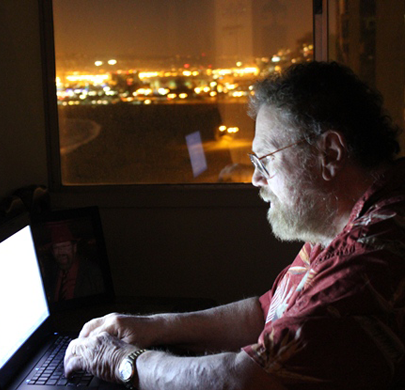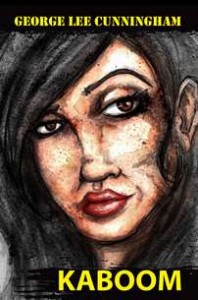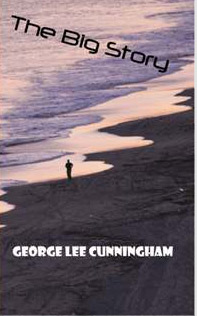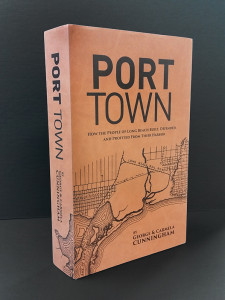FEATURED POSTS
-
May 26, 2018
LYRICS, POETRY AND PROSE 180525
A place to share some words of beauty, inspiration, and life. Today’s lyrics pay homage to the American warriors who live and die protecting our way of life. The first song is the Warrior Song, a raw and angry rap about the life and death ethos of being a warrior and killing your country’s enemies. There are two versions of the song – The Marine version and the Army version. I picked the Army – first because I was in the Army and second because the song includes great quotes by General George Patton. The second song is Toby Keith singing about payback to the enemy, Courtesy of the Red, White And Blue. The third song is a corny and sad tune, sure to bring a tear to your eye if you like country music about life and loss. Click on the name of the piece to get a video or more information.
I bask in the glow of the rising war,
lay waste to the ground of an enemy shore,
wade through the blood spilled on the floor,
and if another one stands I’ll kill some more.
Bullet in the breech and a fire in me,
like a cigarette thrown to gasoline,
if death don’t bring you fear
I swear, you’ll fear these marching feet.
Come to the nightmare, come to me,
deep down in the dark where the devil be,
in the maw with the jaws and the razor teeth,
where the brimstone burns and the angel weeps.
Call to the gods if I cross your path
and my silhouette hangs like a body bag;
hope is a moment now long past,
the shadow of death is the one I cast.– The Warrior Song Writer: Sean Householder
Hey, Uncle Sam put your name at the top of his list
And the Statue of Liberty started shakin’ her fist
And the eagle will fly it’s gonna be hell
When you hear mother freedom start ringin’ her bell
And it feels like the whole wide world is raining down on you
Brought to you courtesy of the red white and blue– Courtesy of the Red, White, and Blue Singer and Songwriter: Toby Keith
Have a beer for me
Don’t waste no tears on me
On Friday night sit on the visitor side and cheer for the home team
Drive my Camaro
90 miles an hour down Redrock Road with “Born To Run” blastin’ on the radio
And find someone good enough for Amy
Who will love her like I would have
If I don’t make it back– If I Don’t Make It Back Singer: Tracy Lawrence; Writers Bobby Pinson & Brett Jones
-
May 4, 2018
The Big Easy – Then and Now
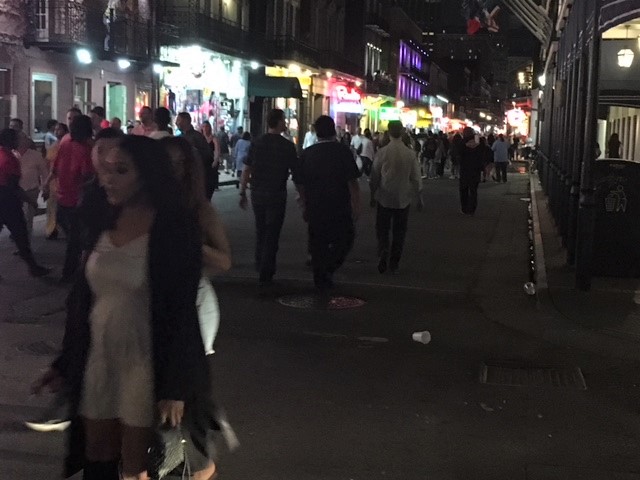
BOURBON STREET NIGHT SCENE – Photo by George Cunningham
The first time I went to New Orleans was in 1964 with my brother Chuck.
I was 23, he was 17. We had enlisted together under what the Army called the “Buddy Plan.” We had just finished basic training in South Carolina the month before, had been home on 30-day leaves, and needed to catch an Air Force flight from Tampa to New Jersey.
I don’t know about today, but back then if you were in the military, you could hitch flights aboard military aircraft if one was going your way.
We waited most of the day around the base with no luck, then somebody said they had a Navy P2 Neptune sub-hunter headed for New Orleans and they had room for a couple of passengers if we were interested. We jumped at the chance. First we had never ridden in a Navy sub-hunter, and second, we had never been to New Orleans. Seemed like a win-win.
We got in late, but somehow got a ride to the French Quarter with a couple of other GIs. The minute we got out of the car, we started hitting the bars and the strip clubs. That’s where I saw Lili St. Cyr, a famous strip tease artist of the time. I had read about her in the pulp men’s magazines of my boyhood – magazines like Stag, Saga, and Battle Cry.
What I didn’t realize at the time – and I’m glad I didn’t – was that the very beautiful, very sexy, very wicked Lili St. Cyr was one year older than my mother. But the lights were low and we were all high on the Schlitz 7–ounce Little Joe beers that the bartender kept selling us at the outrageous 1964 price of $3 apiece.
Ms. St. Cyr did her part, pointing to us individually and giving as a shimmy and a bump-and-a grind to keep us engaged. But when she finished her set she left alone, and if not alone at least not with one of us.
So like a million young men before us, we staggered home from a strip-tease club, whooping and a hollering at the moon, full of youthful passion and unfulfilled desire. We had spent most of our money and had little to show for it besides an experience that I clearly remember many decades later. That’s how it was back then. It may be different now, but I suspect not as different as many people believe.
The next morning, we caught an Air Force flight to New York in a large cargo plane and reported as ordered for duty at Fort Dix, New Jersey.
As for Ms. St. Cyr, she retired from being a dancer in the 1970s, opened her own mail-order lingerie business, the “Undie World of Lili St. Cyr.” In her later years, she became a heroin addict, existing on the kindness of friends and the occasional sale of old photographs. By the time she died in 1999 at 81 years old, she was a toothless recluse, living with her cats in a cluttered and dingy Hollywood apartment.
Sad, but true.
The next time I went to New Orleans was four years later, this time during Mardi Gras with my friend, Eddie Arnold, who I served with during the Vietnam War.
We went, as young men are wont to do, with almost enough money for gas, looking for both fun and trouble. It was at a time before the country was completely crossed and sectioned by interstate highways, and most of our trip was at night, through little Southern towns and two-lane blacktop highways, cutting through the Florida panhandle, across a strip of coastal Alabama, along the Gulf shore of Mississippi, and through the lowlands of Louisiana to New Orleans.
By the time we got to the city, the party was already underway. We parked a couple of miles away – the closest spot we could find – and hiked down to the French Quarter, where we proceeded to buy a pint of whisky and started drinking.
My memory of what happened next – after all this time – is somewhat out of sequence and lacking in detail, but it involved good-natured wrestling, shoving, and grab-assing in the streets over the beads being tossed from the parade floats. Nobody seemed to mind very much, it was basically part of the show.
At some point we got arrested, ordered to pour out our booze, put in a police bus, and then turned loose – after all it was Mardi Gras. The cops didn’t want to ruin anybody’s good time.
We got a couple of paper cups and started clowning around, panhandling folks for free booze. Saying stuff like “can you folks spare a little booze for two vets?” “Got any bourbon, rum, whisky, gin, tequila for two thirsty veterans?” People started laughing and pouring us drinks out of their bottles.
I think about how young and strong I was back then. Eddie passed out sometime after midnight, and I carried him fireman style over my shoulder back to the car. We left the next morning, picking up hitchhikers along the way and collecting any money they had to help fill the tanks.
We stopped by Florida State University in Tallahassee, flirted with the girls there, and gave out our hard fought-over Mardi Gras necklaces in exchange for their spare change. We got home, exhausted but happy, full of bruises and tall tales.
That’s the only time I ever visited New Orleans during Mardi Gras, and probably the only time I ever will. But, I have gone back several times since.
One time I went with my wife Carmela, who had a speaking engagement at a conference to talk about a book she wrote, called Information Access and Adaptive Technology. When the sky cap at the airport checked our bags at LAX, Carmela poked me to give him a tip, but I refused. The smallest bill I had was a $20, and I felt that was too big a tip for putting some tags on our bags.
Carmela was not happy, but she kept her peace, until we arrived in New Orleans at just after midnight. The temperature was near a hundred, and it was raining. That’s when we realized that our bags had somehow been sent to Hawaii. She had to go speak at the conference the next morning in the shorts, top, and wedgies she had been wearing on the plane. I will never forget that story, mainly because Carmela is always there to remind me if I do.
Despite the problems, our suitcases did finally arrive and we spent the next couple of days eating red beans and rice, po’ boy sandwiches, jambalaya, and having chicory coffee with beignets for breakfast at the Café Du Monde. We listened to Dixieland, jazz and the blues, enjoyed cocktails at the various bars, and wandered around poking into art and antique shops. On subsequent trips we rented a car and traveled around the city and took the bridge across the Pontchartrain to explore the countryside. But love New Orleans as we both did, over the years, we watched the jazz and blues clubs being replaced by rock, rap, and pop-music venues. That music is OK, but it’s just not the same as Dixieland and the blues.
We have taken four of our nieces – on two separate trips – to the city, and always we have had a good time. But as time went by and the French Quarter changed, it lost much of its sleazy charm and has become a garish tourist mecca with block after block of cheap bars selling Kool-Aid type blended alcohol drinks in ever-bigger containers, and of scores of souvenir shops selling identical cheap and vulgar t-shirts and strands of Mardi Gras fake jewelry – the kind Eddie Arnold and I fought over in the street 50 years ago.
Times change, and I’m OK with that. Bourbon Street was always bright and vulgar with just a hint of danger down the side streets and alleys. But now it seems almost a caricature of itself, kind of a Disneyland recreation of the Barbary Coast.
Carmela and I have returned several times over the years, watching the transformation of the Quarter.
On our visit last month, the Quarter was crammed with students on spring break – doggedly determined to have a good time, standing in long lines at restaurants, and posing for selfies.
And suddenly, I’m wondering if I’ve just gotten too old for Bourbon Street. Certainly that’s a part of it. Let’s face it – the things that I thought were fun years ago, just seem silly now. But Carmela and I asked ourselves this time around. Did we have a good time on our visit to the Crescent City?
Yeah – kinda. Despite the frustrations and disappointments, it was still like visiting an old friend. We found an outdoor patio where we listened to a jazz combo do Sinatra songs. In the middle of one of those sets, a rat, about as big as a small Chihuahua ran across in front of the stage.
“I’m from Chicago,” said a woman at the next table. “That’s nothing.”
We listened to some other music – a jazzy singer doing old standards and a Zydeco band playing Cajun and Creole tunes about life in the lowlands of Louisiana. It wasn’t that we didn’t have a good time in New Orleans, because we did.
But something was missing. I think it was that wicked, vulgar beauty that we had both fallen in love with years ago.
Do you have a dissenting opinion or any opinion at all on the subject? Contact me at george@georgeleecunningham.com and let me know. Meanwhile, you can always subscribe and get an email reminder of blog postings. Your name will not be shared and you may cancel at any time.
-
LYRICS, POETRY AND PROSE 180504
A place to share some words of beauty, inspiration, and life. Today’s lyrics celebrate the corrupt and beautiful state of Louisiana – a place of wonderful music, delicious cuisine, and a “Joie de Vivre” toward love and life. This week we offer Bob Dylan singing about the House of the Rising Sun, Hank Williams singing about life on the bayou, and Mel McDaniel and Hank Williams Jr., singing about Lousiana Saturday night. Click on the name of the piece to get a video or more information.
Now the only thing a gambler needs
Is a suitcase and a trunk
And the only time he’s satisfied
Is when he’s on a drunk
He fills his glasses up to the brim
And he’ll pass the cards around
And the only pleasure he gets out of life
Is ramblin from town to town– The House of the Rising Sun Singer: Bob Dylan
Goodbye Joe me gotta go me oh my oh
Me gotta go pole the pirogue down the bayou
My Yvonne the sweetest one me oh my oh
Son of a gun we’ll have big fun on the bayou
Jambalaya and a crawfish pie and filé gumbo
Cause tonight I’m gonna see my ma cher amio
Pick guitar fill fruit jar and be gay-o
Son of a gun we’ll have big fun on the bayou– Jambalaya (On the Bayou) Singer: Hank Williams
Well, you get down the fiddle and you get down the bow
Kick off your shoes and throw them on the floor
Dance in the kitchen till morning light
Louisiana Saturday night
My brother Bill and my other brother Jack
Belly full of beer and a possum in a sack
Fifteen kids in the front porch light
Louisiana Saturday night– Louisiana Saturday Night Singer: Mel McDaniel and Hank Williams Jr.; Writer: Bob Mcdill
-
March 15, 2018
Is World Going Faster Or Am I Slowing Down?
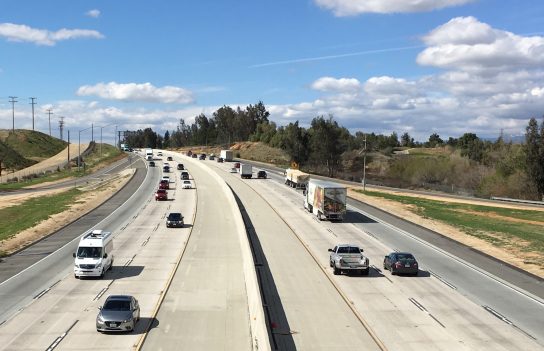
ON THE ROAD AGAIN / Photo by George Cunningham
Sometimes in life, there may be more than one way of looking at things, and all of them can be right. Take traffic, for instance. Driving across country, it seems to me that people are driving faster and faster and closer and closer together.
I’m not the only one thinking this.
Economics professor Sam Peltzman first described this in a paper he published in 1975 that suggested that as cars become safer, drivers are more willing to take more chances on the highway. This became known as the Peltzman effect. I think the professor was on to something, although traffic deaths have gone down during the ensuing years – partly because of vehicle safety standards, a crackdown on drunk driving, restricting teen access to booze and fewer teens behind the wheel.
On the other hand, traffic engineers say that speed limits do little to make highway safer, since drivers tend to ignore such limits and end up driving at whatever speed seems safe to them. As evidence, they cite President Jimmy Carter’s ill-fated attempt to impose a 55 mph speed limit in order to save gasoline. After a short period everybody was ignoring the new limit and driving at the same speeds they were prior to the presidential edict.
When you chart the speed at which people drive in the real world, you find a big difference between the slow drivers and the fast drivers. But one thing they have in common is that they’re both dangerous.
Traffic engineer and consultant Tom Sohrweide says lowering the posted speed limit does not slow down traffic or increase safety, and raising the posted speed limit does not make people drive faster. Studies have shown that 85 percent of motorists drive at around the same speed, no matter what the posted limit is. And this turns out to be the safest speed. The speedsters and the slow pokes have the most accidents because the speedsters are going so fast they have to weave in and out of traffic and the slow pokes are getting in everybody’s way and causing accidents.
As cars become faster and safer, drivers are inclined to increase their speed. But even as the average driver goes faster, they are still safer than drivers that are either going faster than the flow of traffic or slower.
None of which seems to contradict what Sam Peltzman said more than 40 years ago.
Unfortunately, as the world is going faster and faster, I am getting older and older. My personal strategy has been to go as fast as everybody else, but I give myself an edge by leaving more room between me and the drivers ahead of me.
Of course that doesn’t do much to stop some of the speedsters from running up on my tail or some of the slow pokes from getting in my way. Like we used to say in the 60s. You ride with the tide and you go with the flow.
And you try not to do something stupid along the way.
Do you have a dissenting opinion or any opinion at all on the subject? Contact me at george@georgeleecunningham.com and let me know. Meanwhile, you can always subscribe and get an email reminder of blog postings. Your name will not be shared and you may cancel at any time.
-
LYRICS, POETRY AND PROSE 180315
A place to share some words of beauty, inspiration, and life. Today’s lyrics focus on wanderlust – that itchy feeling telling you that it’s time to move on, to see new places, and leave the old places and people behind. This week we offer Hank Snow singing about moving on from love gone bad; Johnny Cash recounting all the places he has visited; and John Prine waxing poetic about the lost world of the hobo. Click on the name of the piece to get a video or more information.
That big eight wheeler rollin’ down the track
Means your true lovin’ daddy ain’t comin’ back
‘Cause I’m movin’ on I’ll soon be gone
You were flyin’ too high for my little old sky
So I’m movin’ on
That big loud whistle as it blew and blew
Said hello to the Southland we’re comin’ to you
And we’re movin’ on oh hear my song
You had the laugh on me so I’ve set you free
And I’m movin’ on– I’m Moving On Singer and Writer Hank Snow
I’ve been everywhere, man
I’ve been everywhere, man
Crossed the deserts bare, man
I’ve breathed the mountain air, man
Travel, I’ve had my share, man
I’ve been everywhere– I’ve Been Everywhere Singer Johnny Cash; Writers Geoff Mack and Michael J. Faubion
Down through the years
Many men have yearned
For freedom
Some found it
Only on the open road
So many tears of blood
Have fell around us
’cause you can’t always do what you are told.– Hobo Song Singer and Writer John Prine

